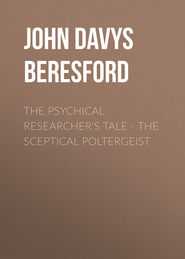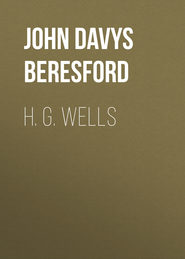По всем вопросам обращайтесь на: info@litportal.ru
(©) 2003-2024.
✖
The Wonder
Настройки чтения
Размер шрифта
Высота строк
Поля
It bowled him. It made his wicket look as untidy as any wicket I have ever seen. The off stump was out of the ground, and the other two were markedly divergent.
"Damn it, I wasn't ready for him," we heard Thorpe say in the professionals' room. Thorpe always had some excuse, but on this occasion it was justified.
C. V. Punshon was the next comer, and he got his first ball through the slips for four, but Wallis looked at me with a raised eyebrow.
"Punshon didn't know a lot about that," he said, and then he added, "I say, what a queer delivery the chap has. He stands and shoots 'em out. It's uncanny. He's a kind of human catapult." He made a note of the phrase on his pad.
Punshon succeeded in hitting the next ball, also, but it simply ran up his bat into the hands of short slip.
"Well, that's a sitter, if you like," said Wallis. "What's the matter with 'em?"
I was beginning to grow enthusiastic.
"Look here, Wallis," I said, "this chap's going to break records."
Wallis was still doubtful.
He was convinced before the innings was over.
There must be many who remember the startling poster that heralded the early editions of the evening papers:
SURREY
ALL OUT
FOR 13 RUNS
For once sub-editors did not hesitate to give the score on the contents bill. That was a proclamation which would sell. Inside, the headlines were rich and varied. I have an old paper by me, yellow now, and brittle, that may serve as a type for the rest. The headlines are as follows:—
SURREY AND HAMPDENSHIRE
EXTRAORDINARY BOWLING PERFORMANCE
DOUBLE HAT-TRICK
SURREY ALL OUT IN 35 MINUTES FOR 13 RUNS
STOTT TAKES 10 WICKETS FOR 5
The "double hat-trick" was six consecutive wickets, the last six, all clean bowled.
"Good God!" Wallis said, when the last wicket fell, and he looked at me with something like fear in his eyes. "This man will have to be barred; it means the end of cricket."
VI
Stott's accident came during the high flood of Hampdenshire success. For two years they held undisputed place as champion county, a place which could not be upset by the most ingenious methods of calculating points. They three times defeated Australia, and played four men in the test matches. As a team they were capable of beating any Eleven opposed to them. Not even the newspaper critics denied that.
The accident appeared insignificant at the time. The match was against Notts on the Trent Bridge ground. I was reporting for three papers; Wallis was not there.
Stott had been taken off. Notts were a poor lot that year and I think Findlater did not wish to make their defeat appear too ignominious. Flower was bowling; it was a fast, true wicket, and Stott, who was a safe field, was at cover-point.
G. L. Mallinson was batting and making good use of his opportunity; he was, it will be remembered, a magnificent though erratic hitter. Flower bowled him a short-pitched, fast ball, rather wide of the off-stump. Many men might have left it alone, for the ball was rising, and the slips were crowded, but Mallinson timed the ball splendidly, and drove it with all his force. He could not keep it on the ground, however, and Stott had a possible chance. He leaped for it and just touched the ball with his right hand. The ball jumped the ring at its first bound, and Mallinson never even attempted to run. There was a big round of applause from the Trent Bridge crowd.
I noticed that Stott had tied a handkerchief round his finger, but I forgot the incident until I saw Findlater beckon to his best bowler, a few overs later. Notts had made enough runs for decency; it was time to get them out.
I saw Stott walk up to Findlater and shake his head, and through my glasses I saw him whip the handkerchief from his finger and display his hand. Findlater frowned, said something and looked towards the pavilion, but Stott shook his head. He evidently disagreed with Findlater's proposal. Then Mallinson came up, and the great bulk of his back hid the faces of the other two. The crowd was beginning to grow excited at the interruption. Every one had guessed that something was wrong. All round the ring men were standing up, trying to make out what was going on.
I drew my inferences from Mallinson's face, for when he turned round and strolled back to his wicket, he was wearing a broad smile. Through my field glasses I could see that he was licking his lower lip with his tongue. His shoulders were humped and his whole expression one of barely controlled glee. (I always see that picture framed in a circle; a bioscopic presentation.) He could hardly refrain from dancing. Then little Beale, who was Mallinson's partner, came up and spoke to him, and I saw Mallinson hug himself with delight as he explained the situation.
When Stott unwillingly came back to the pavilion, a low murmur ran round the ring, like the buzz of a great crowd of disturbed blue flies. In that murmur I could distinctly trace the signs of mixed feelings. No doubt the crowd had come there to witness the performances of the new phenomenon—the abnormal of every kind has a wonderful attraction for us—but, on the other hand, the majority wanted to see their own county win. Moreover, Mallinson was giving them a taste of his abnormal powers of hitting, and the batsman appeals to the spectacular, more than the bowler.
I ran down hurriedly to meet Stott.
"Only a split finger, sir," he said carelessly, in answer to my question; "but Mr. Findlater says I must see to it."
I examined the finger, and it certainly did not seem to call for surgical aid. Evidently it had been caught by the seam of the new ball; there was a fairly clean cut about half an inch long on the fleshy underside of the second joint of the middle finger.
"Better have it seen to," I said. "We can't afford to lose you, you know, Stott."
Stott gave a laugh that was more nearly a snarl. "Ain't the first time I've 'ad a cut finger," he said scornfully.
He had the finger bound up when I saw him again, but it had been done by an amateur. I learnt afterwards that no antiseptic had been used. That was at lunch time, and Notts had made a hundred and sixty-eight for one wicket; Mallinson was not out, a hundred and three. I saw that the Notts Eleven were in magnificent spirits.
But after lunch Stott came out and took the first over. I don't know what had passed between him and Findlater, but the captain had evidently been over-persuaded.
We must not blame Findlater. The cut certainly appeared trifling, it was not bad enough to prevent Stott from bowling, and Hampdenshire seemed powerless on that wicket without him. It is very easy to distribute blame after the event, but most people would have done what Findlater did in those circumstances.
The cut did not appear to inconvenience Stott in the least degree. He bowled Mallinson with his second ball, and the innings was finished up in another fifty-seven minutes for the addition of thirty-eight runs.
Hampdenshire made two hundred and thirty-seven for three wickets before the drawing of stumps, and that was the end of the match, for the weather changed during the night and rain prevented any further play.
I, of course, stayed on in Nottingham to await results. I saw Stott on the next day, Friday, and asked him about his finger. He made light of it, but that evening Findlater told me over the bridge-table that he was not happy about it. He had seen the finger, and thought it showed a tendency to inflammation. "I shall take him to Gregory in the morning if it's not all right," he said. Gregory was a well-known surgeon in Nottingham.
Again one sees, now, that the visit to Gregory should not have been postponed, but at the time one does not take extraordinary precautions in such a case as this. A split finger is such an everyday thing, and one is guided by the average of experience. After all, if one were constantly to make preparation for the abnormal; ordinary life could not go on....
I heard that Gregory pursed his lips over that finger when he had learned the name of his famous patient. "You'll have to be very careful of this, young man," was Findlater's report of Gregory's advice. It was not sufficient. I often wonder now whether Gregory might not have saved the finger. If he had performed some small operation at once, cut away the poison, it seems to me that the tragedy might have been averted. I am, I admit, a mere layman in these matters, but it seems to me that something might have been done.
I left Nottingham on Saturday after lunch—the weather was hopeless—and I did not make use of the information I had for the purposes of my paper. I was never a good journalist. But I went down to Ailesworth on Monday morning, and found that Findlater and Stott had already gone to Harley Street to see Graves, the King's surgeon.
I followed them, and arrived at Graves's house while Stott was in the consulting-room. I hocussed the butler and waited with the patients. Among the papers, I came upon the famous caricature of Stott in the current number of Punch—the "Stand-and-Deliver" caricature, in which Stott is represented with an arm about ten feet long, and the batsman is looking wildly over his shoulder to square leg, bewildered, with no conception from what direction the ball is coming. Underneath is written "Stott's New Theory—the Ricochet. Real Ginger." While I was laughing over the cartoon, the butler came in and nodded to me. I followed him out of the room and met Findlater and Stott in the hall.
Findlater was in a state of profanity. I could not get a sensible word out of him. He was in a white heat of pure rage. The butler, who seemed as anxious as I to learn the verdict, was positively frightened.
"Well, for God's sake tell me what Graves said," I protested.
Findlater's answer is unprintable, and told me nothing.
Stott, however, quite calm and self-possessed, volunteered the information. "Finger's got to come off, sir," he said quietly. "Doctor says if it ain't off to-day or to-morrer, he won't answer for my 'and."








